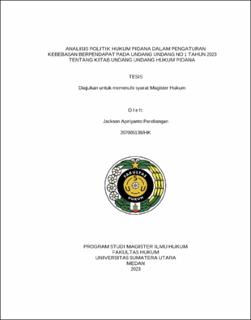| dc.description.abstract | With the passing of the new Criminal Code which has become Law No.1 of 2023 has sparked the issue of restricting freedom of speech again, due to the existence of articles on insulting the president and vice president, which has long been decriminalized in Decision 013-022 / PUU-IV / 2006 and the presence of articles on insulting state institutions along with the criminalization of organizing demonstrations, there are 5 articles that attract attention to this description, namely articles 218 and 219, namely the offense of insulting the president and 240 and 241 on insulting state institutions, up to article 256 related to criminalization of organizing demonstrations.
This research is normative juridical, with the aim of obtaining qualitative results, the approach taken is a statutory approach, as well as by means of library research, by studying and analyzing books, laws and regulations and other sources.
In conclusion, the human right to express as guaranteed in positive law in Indonesia is regulated in Article 28 E paragraph 3 and also in Law No.39 of 1999 concerning Human Rights, which is contained in Articles 14, 23, 24, and 25 which essentially guarantees protection in the freedom to express opinions and convey information. However, freedom of expression must also be limited in order to protect the dignity of citizens as this is also stated in Article 29 paragraph (1) of Law No.39 of 1999, Delict Construction in Articles 218, 219, 240, 241, 256 of Law No.1 of 2023 which has caused controversy. 2023 which has caused controversy because it is alleged to have curbed the rights of citizens to express opinions against the President and vice president (218-219) State institutions (240-241) and also the criminalization of demonstration efforts in article (256) is not as public opinion of these articles, because efforts to carry out criminal persecution against citizens who express their opinions have been further narrowed by changing the form of offense in articles 218, 219 and 240, 241 into a form of complaint offense, as well as providing a formal offense form with article 256, thus narrowing the possibility of abuse of power by enforcers certain laws to criminalize efforts to express opinions in the form of demonstrations. Articles that are alleged to have obstructed the public's right to express opinions, namely insulting the President and Vice President, insulting State Institutions, and criminalizing demonstrations without notification are still worth defending, because the right to express opinions is a derogable right which means that the right can be reduced and limited so as not to deviate from other rights. With the codification of Articles 218, 219, 240, 241, being a complaint offense and Article 256 in the form of a formal offense which in essence narrows the abuse of authority of certain individuals in the enforcement of the law against criminal acts of insult is the maximum effort to give freedom to the public in expressing their opinions.
Suggestions for the future need further legal education in every scope of legal culture both to the public and law enforcers on the difference between insults and criticism, and provide an understanding that does not cause multi-interpretations that will cause problems in the future, as well as very massive socialization in every legal product that will be passed and which has been legalized in the form of public discussions to every layer of society to broaden people's insights in a legal product so as to narrow the efforts of abuse of power in law enforcement. and the need for new formal criminal rules that can support Law No.1 of 2023, which prioritizes a restorative legal approach rather than a retributive legal approach because of the public's prejudice against Law No.1 of 2023 due to lack of public trust in the law enforcement process. 2023, which prioritizes a restorative legal approach rather than a retributive legal approach because of the public's prejudice against Law No.1 of 2023 due to the lack of public trust in the law enforcement process. | en_US |


